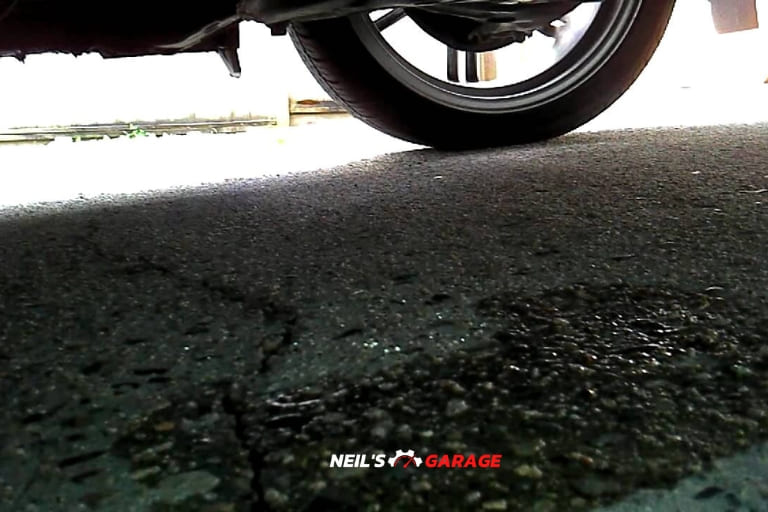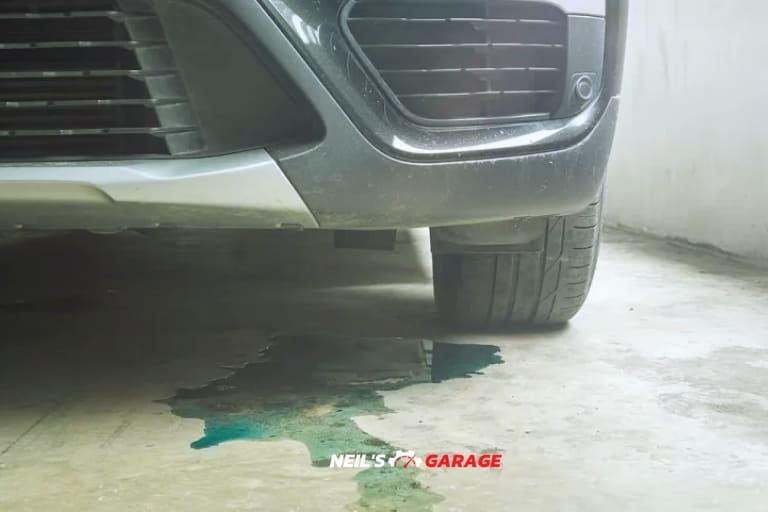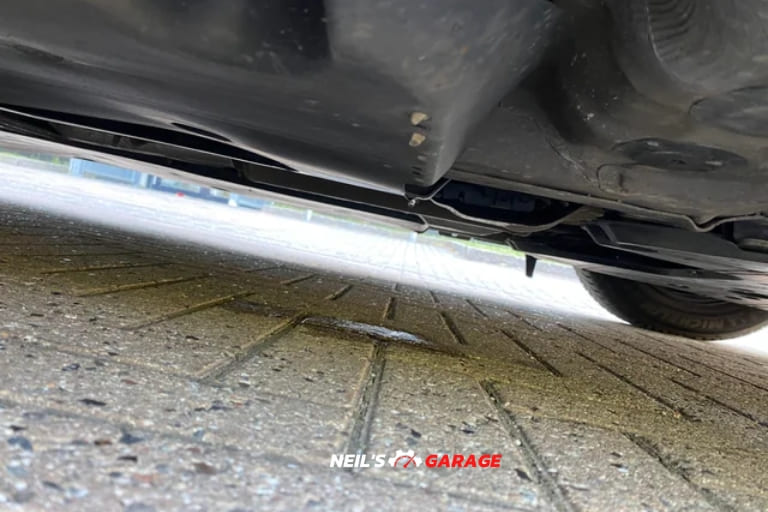Have you ever observed water dripping from the bottom of your car after using the air conditioner for a while? As a car owner, you must have wondered what it signifies or why water is dripping from car AC. There are many causes of car AC water leaks which will be discussed in this blog. Some solutions to handle this issue properly are all covered in this blog. Let us explore the secrets underlying your car’s leaks now!
Contents
- 1 Why is Car AC Leaking Water?
- 2 What are the symptoms of a car AC leak?
- 3 How to Find a Car AC Leak?
- 4 How to Fix the Air Conditioner Leaking Water Inside the Car?
- 5 How can I prevent a car AC from leaking water in the future?
- 6 How Much Does it cost to fix the car ac leaking water inside?
- 7 Is it normal for a car to leak water when the AC is off?
- 8 Frequently Asked Questions
- 9 Conclusion
Why is Car AC Leaking Water?

Your car’s air conditioner may leak or drip water for a variety of reasons. Below are a few of the most typical causes:
Condensate drain blockage
A condensate drain obstruction is one of the most frequent causes of your car’s air conditioner water leaks. In the drain line, dirt, debris, or even mold can build up over time, preventing water from flowing and causing it to back up into your car.
Improper installation of AC components
Water leaks may also be caused by improper AC component installation. If the drain tube is not connected or placed properly, water may seep into places it shouldn’t, creating leaks.
Low refrigerant levels
Your air conditioner uses refrigerant to cool itself, and low refrigerant levels can reduce the system’s effectiveness, making the evaporator coils colder. The result is leaking water from car AC vents because the extra condensation cannot evaporate rapidly enough in this situation.
Damaged evaporator core
Water leaks may result from a broken evaporator core, which is in charge of chilling the air. If the core starts to fracture or break, moisture may be able to escape and collect within the car, resulting in water dripping inside the car from AC.
Dirty or restricted air filter
The airflow within the AC system might be hampered by a filthy or congested air filter, which can result in the evaporator coil being too chilly. As a result, more condensation is created, which raises the possibility of water leaks.
Clogged windshield cowl drain
A concealed cause of water leaks may be a plugged windshield cowl drain. This drain is in charge of clearing away water that gathers close to the windshield; if it is blocked, the extra water may seep into the car and result in a leak due to the car AC water drainage problem.
What are the symptoms of a car AC leak?
There are several signs that may appear when the AC system in your car is leaking, signaling the existence of a problem. You may immediately troubleshoot a car AC water leak by noticing these symptoms. Here are a few typical signs of an AC leak in a car:
Water leaking inside the car
The appearance of water inside your car is one of the most obvious symptoms that your air conditioner is leaking. Water may accumulate on the floorboards, especially close to the front passenger side. This water generally results from the AC system’s condensation not draining correctly.
Musty smell coming from the vents
If water builds up and sits still within the AC unit, it may provide a moist environment that encourages the development of mold and mildew. The growth of molds and mildews can eventually result in a musty smell coming from the vents and blockage in the drainage system.
Decreased AC performance
An AC leak may impact the effectiveness of the cooling system. It may indicate a refrigerant leak or damaged system components if you notice that the air coming from the vents is not as cold as it once was or takes longer to chill the inside.
Frost or ice on the evaporator core
The evaporator core may occasionally get too chilly due to a refrigerant leak or poor AC system performance. This can prevent the evaporator coils from cooling the air effectively by causing frost or ice to build on them.
How to Find a Car AC Leak?

Finding an AC leak in a car can be difficult, but a systematic approach can improve your chances of finding the cause. Here are a few techniques to assist you in locating an AC leak in a car:
Look for puddles of water under the car after running the AC.
Turn on the Air Conditioner of your car. After turning on the air conditioning, look under your car for any pools of water. If you see any, there may be a leak. Dealing with car AC water puddles is necessary to avoid serious damage to the Ac components.
Check for water inside the car, especially around the AC vents.
It indicates a leak if you discover water inside your car, particularly around the AC vents. A blocked drain pipe or a broken evaporator core are the primary culprits.
Use a black light to look for moisture in the AC system.
Turn off all the lights and examine the AC parts with the black light. Check for any green or yellow stains that might indicate a leak if you notice them.
How to Fix the Air Conditioner Leaking Water Inside the Car?
The steps to fix a car air conditioner that is dripping water inside are as follows:
Check the condensate drain.
Checking the condensate drain for obstructions should be your first action. If so, blow away the particles using a wet/dry vacuum.
Check the evaporator core.
Check the evaporator core for any damage or frost buildup if the condensate drain is clear. Turn off the AC and let it defrost if there is frost buildup before turning it back on.
Check the compressor.
Examine the compressor for damage or leaks if the evaporator core is in good condition. The compressor must be changed if there are any leaks.
Replace the seals.
If none of these remedies work, your AC system’s seals might need to be replaced.
Also, Read:
How can I prevent a car AC from leaking water in the future?
To prevent your car ac from leaking water, you must follow these few easy steps:
Have your AC system serviced regularly.
Regular maintenance can assist you in identifying and resolving any issues with your AC system before they worsen. A qualified technician can inspect the hoses, seals, valves, and other AC system parts for leaks, cracks, or other problems. To increase the effectiveness and efficiency of the AC system, they may also clean the condenser, evaporator, and filter.
Also, refer to the car’s owner’s handbook to check how often it is advised to get your car serviced. However, this may change based on your car’s age, condition, temperature, and where you reside.
Keep the condensate drain clear of debris.
You can gently poke into the hole with a wire or a pipe cleaner to eliminate any obstruction from the condensate drain. To clear any material from the drain, you may also spray some compressed air or water down it. This should be done sometimes, especially after traveling on sand- or rain-covered roads.
Use a high-quality refrigerant.
Water leaks can be avoided by using a high-quality refrigerant. But it is important to understand that not all refrigerants are good. Some refrigerants can erode, harm, or even cause leaks in the AC system’s parts.
In car air conditioning systems, three primary types of refrigerants are utilized:
- Freon (R12 refrigerant)
- R134a refrigerant
- R1234yf refrigerant
Avoid driving through deep water.
An excellent approach to stop future water leaks is to avoid driving through deep water. When driving through puddles or flooded roads, splashing water into the car’s air conditioning system might result in leaks. The components of the AC system may sustain damage from water entering through vents, the condenser, or the drain line.
Additionally, water in the automobile might result in electrical issues, rust, and corrosion. Additionally, the gearbox, engine, and brakes may all be impacted. Deep-sea driving may be risky and expensive.
How Much Does it cost to fix the car ac leaking water inside?
The cost of fixing a car AC leaking water inside depends on the severity of the leak and the location of the leak. In general, the cost ranges from $50 to $500.
- A small leak in the evaporator drain hose or drain pan can be fixed for $50 to $100.
- A larger leak in the evaporator core or condenser coil can cost $200 to $500 to fix.
- A leak in the compressor is the most expensive to fix and can cost $500 to $1,000 or more.
Is it normal for a car to leak water when the AC is off?

Yes. It is completely normal for a car to release water when the AC is turned off, especially if you’ve been using the AC recently. The reason behind this water leakage is the condensation that occurs within the car’s air conditioning system. When the AC runs, it cools down the air inside, causing moisture to turn into water droplets on the evaporator coil. This condensed water then drips out of the vehicle through a drain tube typically located underneath.
But it is important not to ignore water leakage as it can lead to issues over time. If water consistently builds up inside your car, it can result in mold and mildew growth, which can cause odors and potentially impact air quality inside your vehicle. Additionally, prolonged exposure to moisture could damage your carpets and upholstery.
While water leakage itself may not directly affect how well your AC performs, if there are any clogs or damage in the drainage system, it can lead to problems. A blocked drain tube can cause water backup. Potentially harm your AC system affecting its cooling efficiency and overall performance. Therefore it’s crucial to ensure that your drainage system is functioning properly.
If this problem is left unaddressed, water leakage can pose a risk to the components of your car well. If water builds up, it can get into the connections or sensitive parts, leading to corrosion and possible electrical problems. Moreover, moisture inside the car can harm devices like radios, speakers, and navigation systems.
Frequently Asked Questions
Is it normal for my car to leak water when my AC is on?
Yes. It is normal for a car to leak water when the air conditioner is running, especially on hot days. This results from the AC condensing and draining the moisture from the air inside the car.
How much water is normal to leak from Car AC?
Depending on the humidity, the amount of water each day might range from 5 to 20 gallons. However, water can back up and leak inside the car if the drain is broken or clogged.
Conclusion
In conclusion, identifying the causes of an auto air conditioner leak and acting quickly to fix the problem are essential for preserving comfort and functionality.
It’s important to pay attention to signs like water inside the car, musty smells, and decreased cooling efficiency. Future leaks can be avoided by performing routine maintenance, emptying condensate drains, utilizing high-quality refrigerants, and avoiding driving through deep water.
Ignoring water leaks can result in mold growth, poor air quality, and damage to auto parts. While some water loss when the AC is running is typical, leaks when the AC is off require repair. Preventative maintenance will make driving enjoyable and increase the AC system’s lifespan.
So, always take your car for regular maintenance to have the best and long lifespan of your car.
Also, Read:
- Car Air Conditioning Symbols Meaning
- Car AC Making Rattling Noise Explained
- Why Does Your Car AC Only Work When You’re Driving?
- Does Your Car AC Need Recharging?
- Car AC Hissing Noise
- Car AC Leaking Water: Causes, Fixes, and Prevention Tips
- Troubleshooting: Car Air Conditioner Not Working? Here’s What to Do
